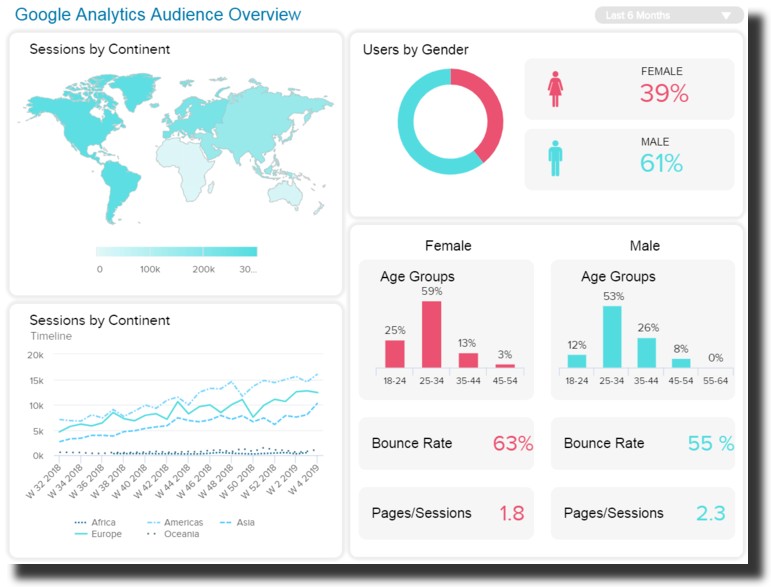Just How to Improve Performance with Comprehensive Analytics
Make The Most Of Development: How Analytics Drive Better Techniques
By taking advantage of information understandings, companies can fine-tune their functional strategies, anticipate market modifications, and improve consumer involvement. The challenge lies not only in gathering information yet in properly interpreting it to drive tangible outcomes.
Comprehending Data Analytics
Data analytics is a methodical computational evaluation of information that makes it possible for companies to reveal purposeful patterns and understandings. This procedure incorporates a selection of strategies, consisting of analytical evaluation, anticipating modeling, and information mining, which jointly aim to transform raw data right into actionable details - Analytics. By utilizing these methodologies, organizations can make informed decisions that are rooted in empirical evidence as opposed to intuition alone
The foundation of data analytics exists in its capacity to take care of substantial quantities of info from diverse sources. This includes organized information, such as databases, and unstructured data, consisting of social media sites communications and client feedback. Via the usage of specialized software program and tools, analysts can remove and refine this data successfully, identifying trends and relationships that might not be right away obvious.
Understanding information analytics likewise involves identifying the relevance of data quality and honesty. Dependable and exact data is crucial for purposeful analysis; hence, companies must apply robust information governance practices. The repetitive nature of analytics allows for constant improvement and enhancement of approaches, making sure that organizations stay agile in the face of altering market dynamics and customer habits.
Trick Advantages of Analytics

One of the essential benefits of analytics is its ability to provide workable insights. Organizations can quickly examine vast amounts of data, discovering patterns that might not be instantly noticeable.
An additional substantial benefit is improved consumer understanding. Analytics tools enable businesses to segment their target market, track consumer behavior, and customize advertising efforts. This targeted approach not just boosts client involvement however also drives higher conversion rates.

Implementing Analytics Techniques
To fully realize the benefits of analytics, companies should adopt organized techniques for application. This begins with clearly specifying purposes that line up with broader service objectives. By establishing specific, quantifiable results, organizations can focus their analytics efforts on areas that produce the greatest roi.
Next, organizations ought to focus on information governance to ensure the stability and click resources safety and security of the information being assessed. This involves establishing methods for information collection, storage, and access while sticking to appropriate laws. Making sure high-grade information is vital for creating meaningful understandings.
Furthermore, cultivating a culture of data-driven decision-making is crucial. This requires training staff members to translate analytics searchings for and motivating cooperation across divisions. When groups understand the worth of analytics, they are most likely to incorporate insights right into their everyday procedures.
Finally, organizations need to on a regular basis examine and refine their analytics techniques. The landscape of data and innovation is continually developing, and remaining adaptable will enable companies to leverage new devices and methodologies successfully. By applying these structured methods, organizations can take full advantage of the influence of their analytics campaigns and drive lasting development.
Devices for Effective Analysis
Reliable evaluation counts on a Click Here selection of devices that assist in the extraction of understandings from information - Analytics. These tools can vary from straightforward spreadsheet applications to innovative maker finding out platforms, each serving a special function in the analytical process
Data visualization software program, such as Tableau and Power BI, plays a vital function in transforming complicated datasets into understandable visual representations. These devices allow experts to recognize patterns and trends quickly, permitting even more educated decision-making.
Statistical analysis software application, like R and SAS, offers sophisticated capabilities for performing in-depth evaluations, consisting of regression, theory screening, and predictive modeling - Analytics. These attributes equip companies to draw useful content significant conclusions from their information, identifying potential opportunities and dangers
Moreover, data source management systems such as SQL and NoSQL databases supply the essential infrastructure for keeping and inquiring huge volumes of data successfully. They make sure that data is arranged and easily accessible for evaluation.
Lastly, business intelligence systems incorporate various data sources, supplying a detailed sight of business performance. By utilizing these devices properly, businesses can boost their logical capacities, allowing them to create methods that take full advantage of development and enhance general efficiency.
Situation Research Studies of Success
Successful organizations usually utilize data analytics to drive impactful strategies, as shown by numerous noteworthy study. One famous example is Netflix, which makes use of advanced formulas to evaluate customer choices and habits. By utilizing these insights, Netflix has successfully tailored its material referrals, leading to increased customer involvement and customer retention. Their data-driven approach has actually unquestionably contributed to their standing as a leading streaming service.

In addition, Starbucks utilizes information analytics to identify optimal store places and fine-tune its product offerings. By examining client demographics and buying patterns, Starbucks successfully identifies high-potential markets and tailors its food selection to neighborhood preferences, driving sales and customer commitment.
These instance research studies illustrate that efficient utilization of data analytics can bring about tactical advantages, cultivating technology and development within organizations across various markets.
Conclusion
In final thought, the combination of analytics right into organizational approaches substantially improves decision-making procedures and fosters lasting development. The effective execution of analytics devices further sustains agility and advancement, allowing organizations to browse affordable landscapes with better precision.
Information analytics is an organized computational analysis of data that enables organizations to uncover meaningful patterns and understandings.Comprehending data analytics also involves recognizing the importance of data high quality and integrity. Reliable and exact information is crucial for purposeful evaluation; hence, companies need to carry out robust information governance techniques.Next, companies should focus on data governance to make sure the honesty and protection of the data being assessed.Effective companies commonly leverage data analytics to drive impactful methods, as evidenced by several noteworthy case research studies.